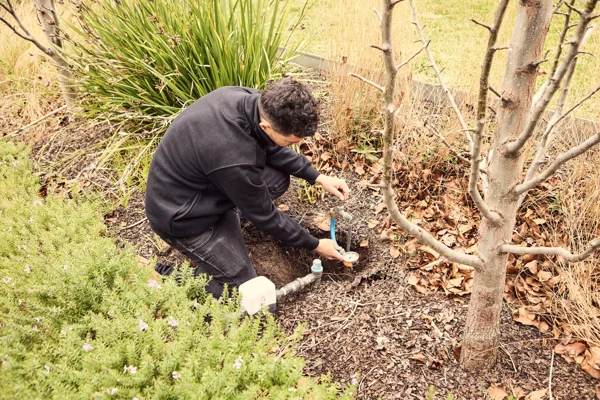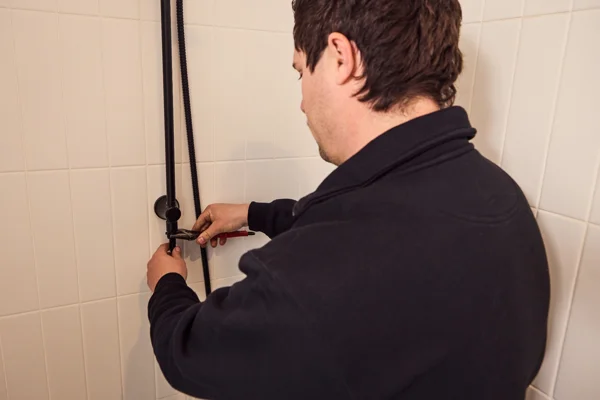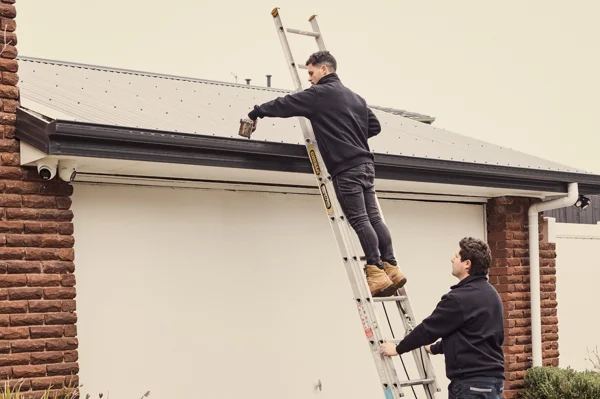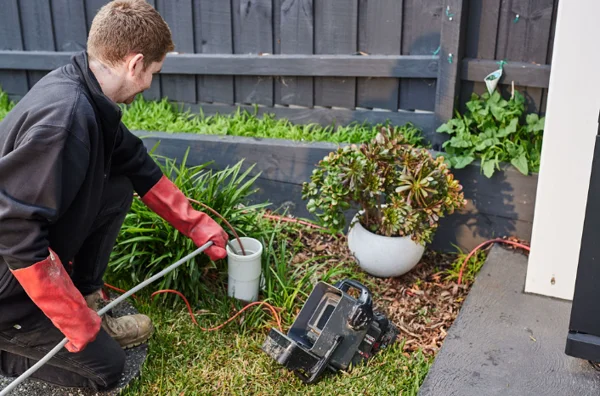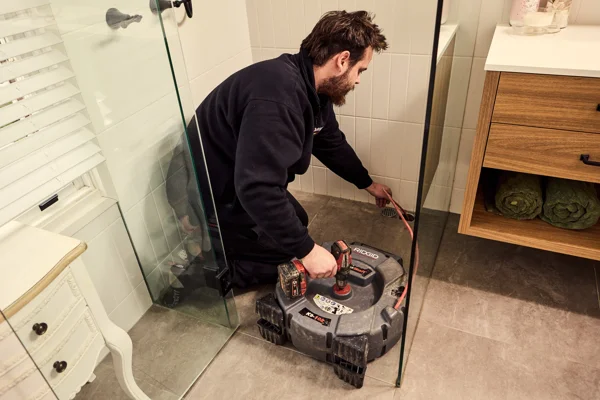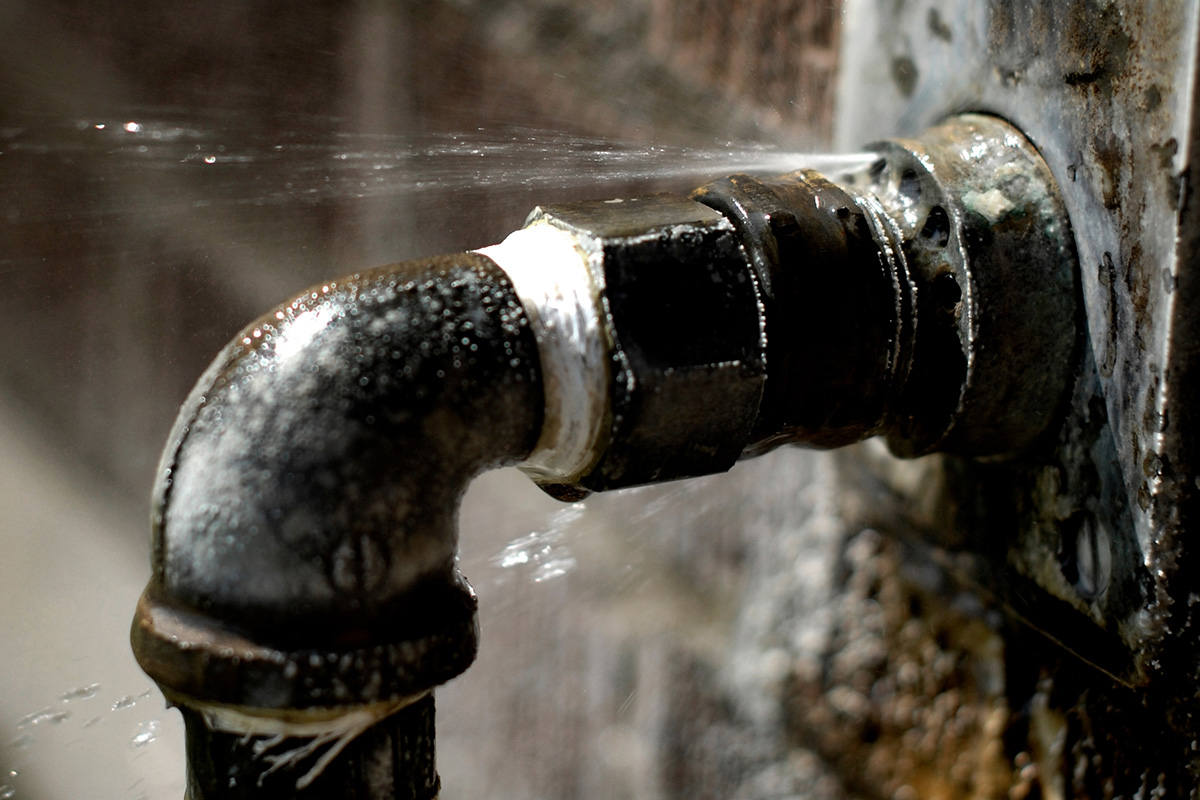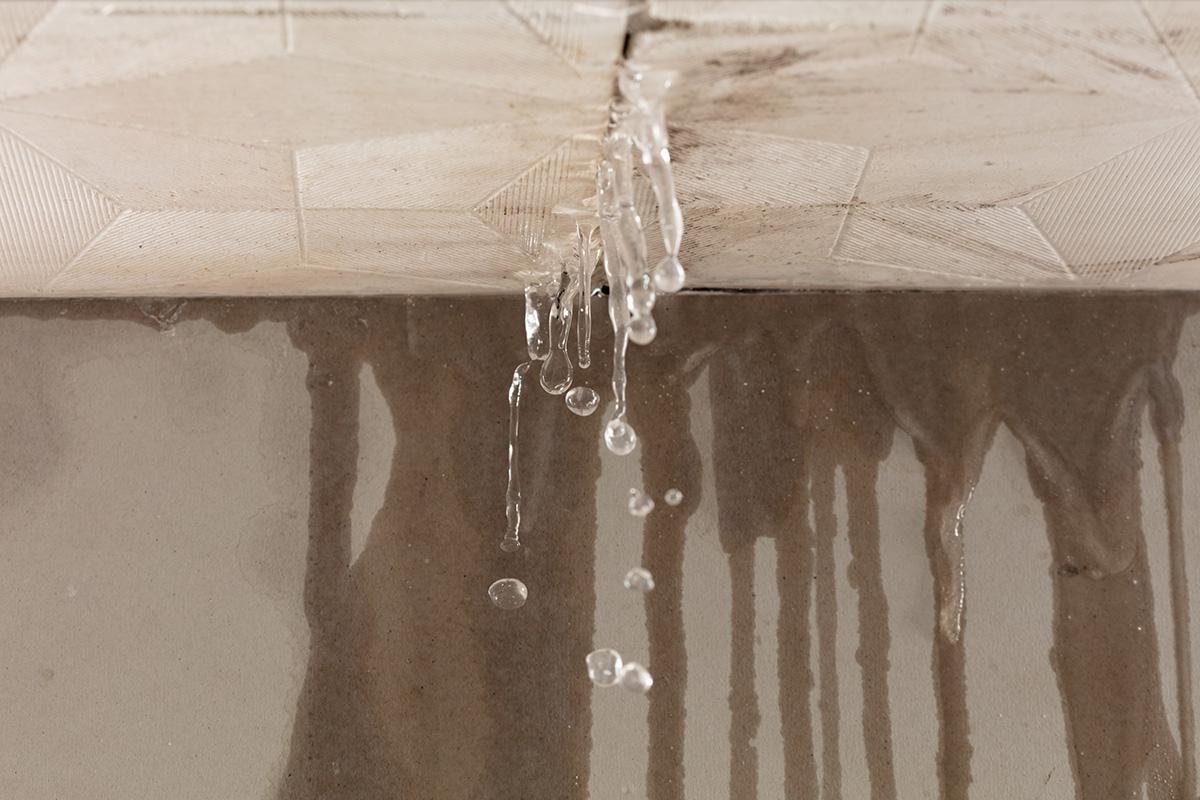Water leak detection service in Melbourne
Outright Plumbing offers expert leak detection with same-day response and clear, fixed prices. With 25+ years of experience and 700+ five-star reviews, we’ll find and fix your leak the right way.
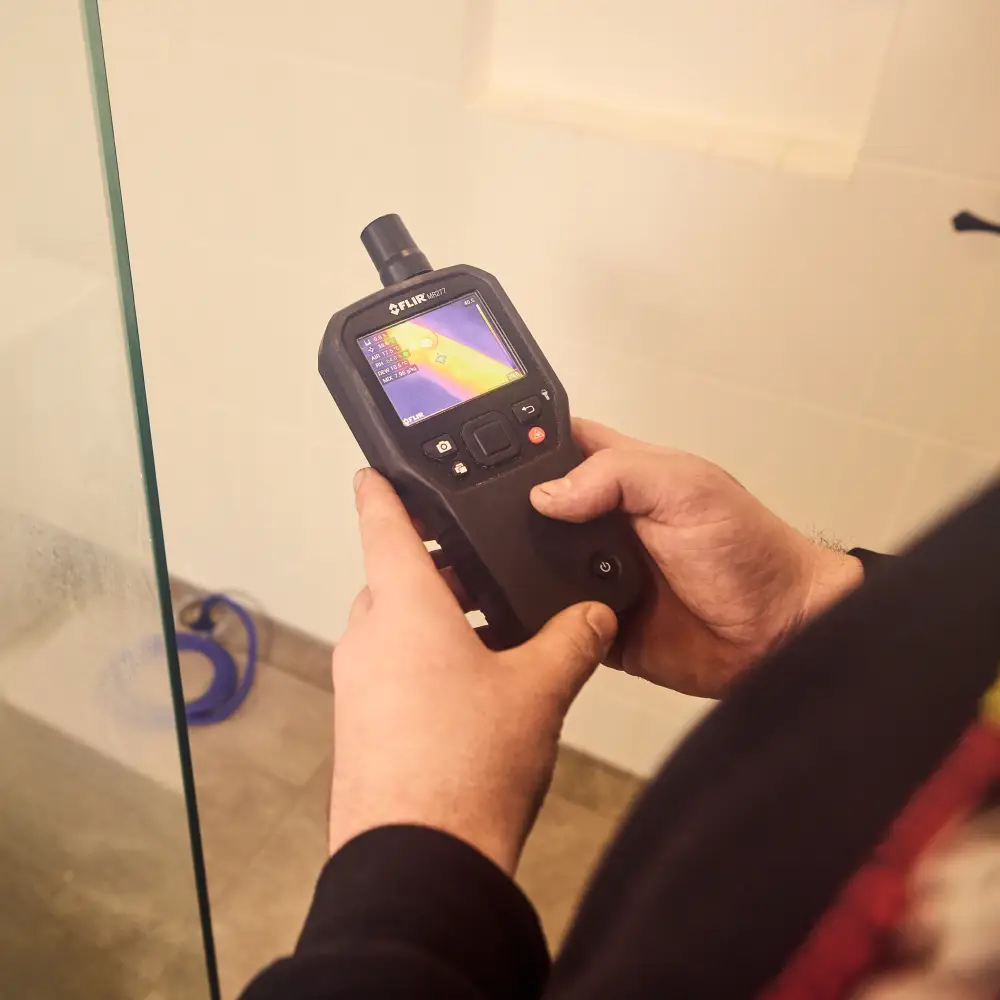
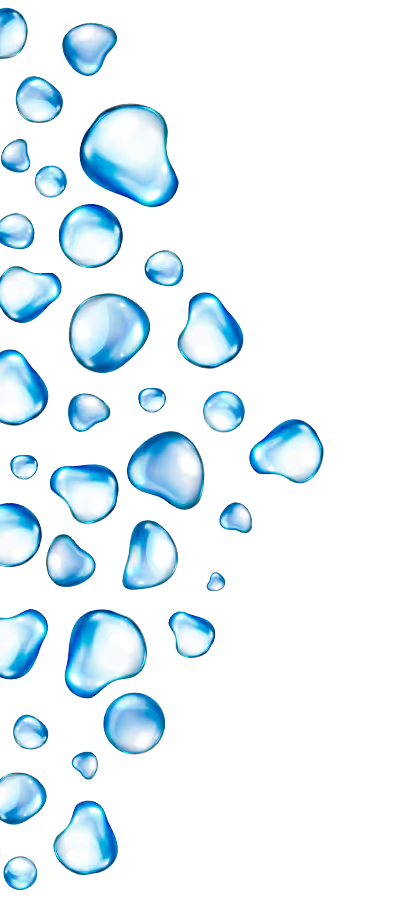

Outright Plumbing’s advanced know-how makes leak detection faster and less disruptive
Plumbing leaks don’t always show themselves where you expect. Water can travel through walls, floors, or soil before it appears, which makes finding the source tricky without the right tools. Outright Plumbing’s licensed plumbers use advanced leak detection equipment to locate problems quickly and repair them with minimal disruption.
- We detect hidden leaks using CCTV, thermal imaging, acoustic sensors, and pressure testing.
- Our plumbers locate the source accurately so repairs are targeted, not guesswork.
- Leak detection prevents unnecessary damage to floors, walls, and gardens.
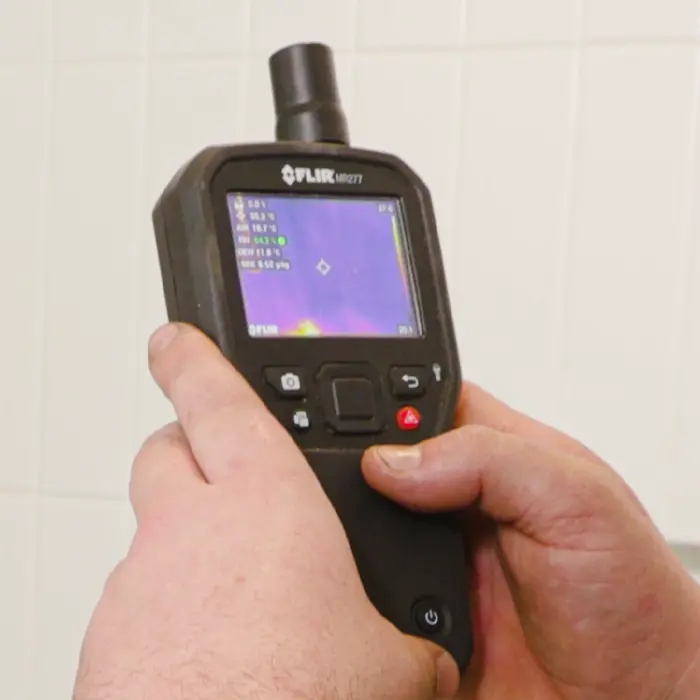
Our plumbing services
Finding and fixing hidden leaks is just one part of what we do. Outright Plumbing offers a full range of plumbing services across Melbourne, from urgent call-outs to new installations. Explore our services below to see how we can help with every part of your home or business.
Over 700 five-star Google reviews tell Outright Plumbing’s story
Over 700 five-star Google reviews tell the story. People call us reliable, friendly and professional, and many keep our number handy for the next time something goes wrong.
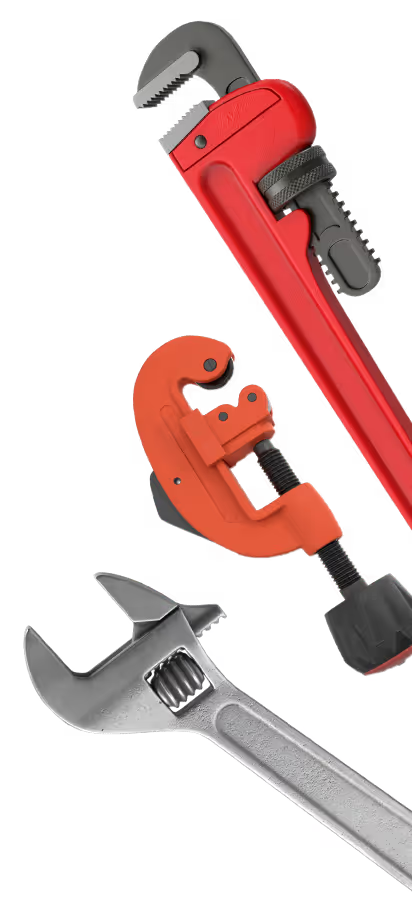
Outright Plumbing can find and fix every kind of leak
Leaks don’t always show up where you expect them. Water can travel through soil, timber, or plaster before it appears, which is why the source is often hidden. Outright Plumbing uses specialised leak detection equipment to track down the problem quickly and accurately in all types of properties across Melbourne.
Underground water main leaks that waste thousands of litres
When a water main leaks underground, you might notice low pressure, higher bills, or damp patches that never dry out. The problem is that the water often spreads sideways through soil and never surfaces. We use acoustic sensors and pressure testing to locate the leak precisely, so only the affected section is dug up and repaired.
Leaks inside walls and ceilings that cause hidden damage
Small splits in copper or plastic pipes can soak insulation, timber, and plasterboard before there are any visible signs. By the time a stain appears, the damage has usually spread. Using thermal imaging and moisture meters, we can trace the source of a leak inside walls or ceilings without cutting unnecessary holes.
Bathroom leaks that appear after new renovations
Bathrooms are one of the most common sources of leaks, especially after new tiles or fittings are installed. Showers, vanities, and concealed pipes can all fail or be sealed incorrectly. Detecting leaks early avoids water damage that ruins fresh renovations and prevents costly rework down the track.
Garden and outdoor leaks that drain pressure
Outdoor irrigation lines, garden taps, and buried pipework often develop leaks that go unnoticed until the water bill spikes. These leaks don’t always leave obvious wet spots, particularly in sandy or fast-draining soil. Our plumbers use acoustic and visual inspection tools to confirm the location without pulling up whole garden beds.
Our plumbers share their insights on leak detection
Most people only notice a leak once there’s a damp patch, higher water bills, or visible damage. But by that stage, the water has usually been escaping for weeks or even months. At Outright Plumbing, we’ve spent decades tracing leaks in Melbourne homes, and there are a few things we think every homeowner should understand about how leaks behave and why professional detection makes a difference.
The first sign of a leak isn’t always where the problem is
Water doesn’t leak in straight lines. It travels along joists, behind plaster, or through soil before finally appearing somewhere visible. That’s why a stain on a ceiling may have started metres away in an upstairs bathroom, or a wet patch in the garden might trace back to a split mains pipe near the boundary.
This is one of the most common points of confusion for homeowners, and the reason DIY patch jobs rarely work. Without specialist tools like acoustic detectors or thermal imaging, it’s almost impossible to know where the leak actually started.
The hidden costs of ignoring a small drip
A steady drip might not feel urgent, but over time it can cause more damage than a dramatic burst. We often see timber framing that has rotted quietly behind walls, plaster that has sagged from being soaked for months, and mould spreading where ventilation is poor. Even outdoors, leaks can undermine paving or soften soil under foundations.
And then there’s the water bill. A slow leak can waste thousands of litres a month, adding unnecessary costs to your household. Tackling leaks early is one of the simplest ways to protect both your home and your budget.
Modern leak detection avoids unnecessary damage
Years ago, finding a hidden leak often meant guesswork: cutting into walls, pulling up tiles, or digging exploratory holes. Today, we use equipment that lets us pinpoint the leak without turning your home upside down. Acoustic sensors pick up the sound of water escaping, thermal cameras highlight hidden moisture, and pressure testing tells us exactly which line is affected.
These tools don’t just save time. They prevent damage. Instead of ripping up a whole bathroom floor, we can target the repair to the precise spot where the problem starts.
Local knowledge speeds up detection in Melbourne homes
After decades working in Bayside and Melbourne’s southern suburbs, we know the common patterns of failure. Older weatherboard homes often have brittle copper pipes that split under pressure. Newer estates use plastic fittings that can crack where they join. And sandy soils in coastal areas can shift, pulling mains connections apart underground.
Understanding these local quirks means we don’t waste time chasing the wrong lead. We can often narrow down the likely cause before we even bring out the equipment, which makes the whole process faster and less disruptive.
What’s included with our non-invasive leak detection service
We handle every step of the job so you know exactly what’s happening and what comes next.
Finding the leak without the guesswork
We use advanced equipment to locate the problem precisely, so we only open up what’s necessary with no unnecessary holes or digging.
Clear diagnosis and repair options
Once we’ve found the leak, we’ll explain the cause in plain English and give you straightforward solutions, whether it’s a quick repair or a bigger job caused by a blocked or burst pipe.
Fixes that last and advice to keep it that way
We use proven repair methods and quality parts, so the problem stays solved. You’ll also get practical tips and, if you’d like, an ongoing maintenance plan to help prevent future leaks.
Starting to stress? Book our leak detection plumbers today!
Outright Plumbing will be there in a jiffy with all the parts and equipment we need to pinpoint and repair the fix immediately. Give us a call and let’s get it done.
Jobs we can’t help bragging about (at least a little)
Our case studies are the real deal: actual Melbourne plumbing jobs where we rolled up, got it sorted, and left happy customers behind. Have a read and see why we’re still talking about them.
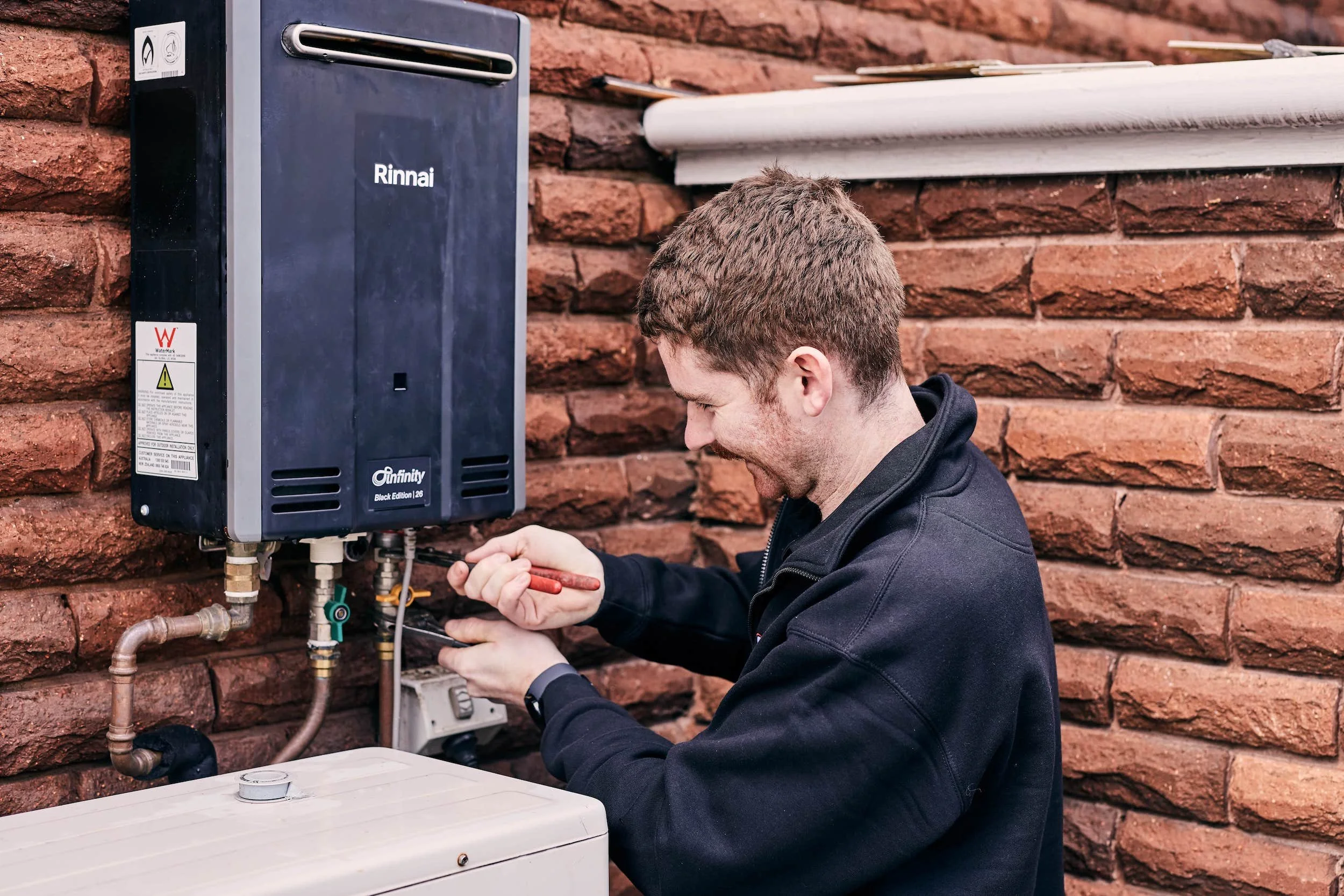
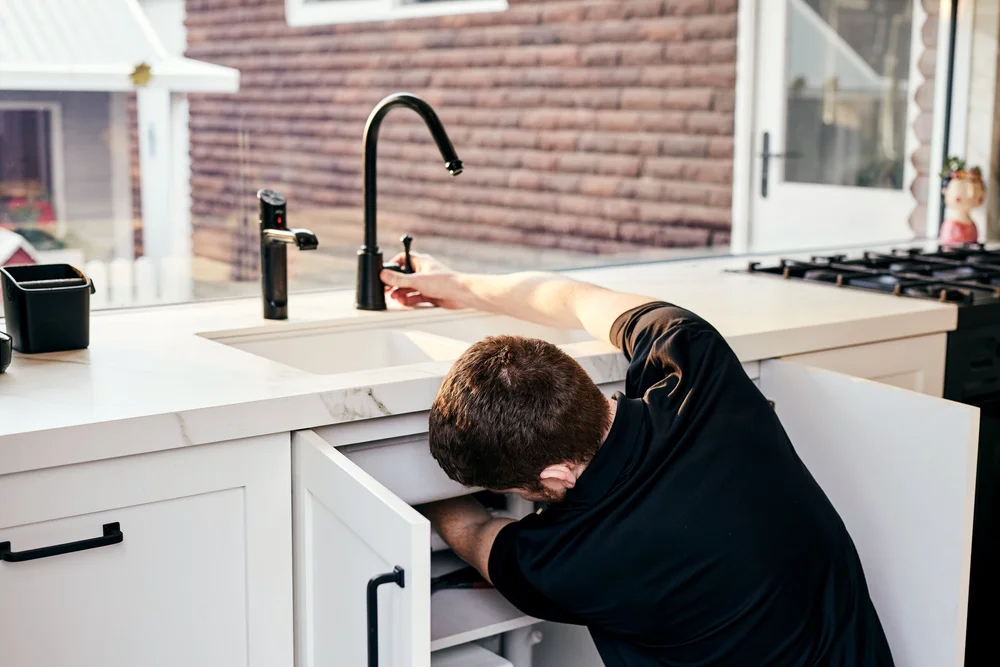
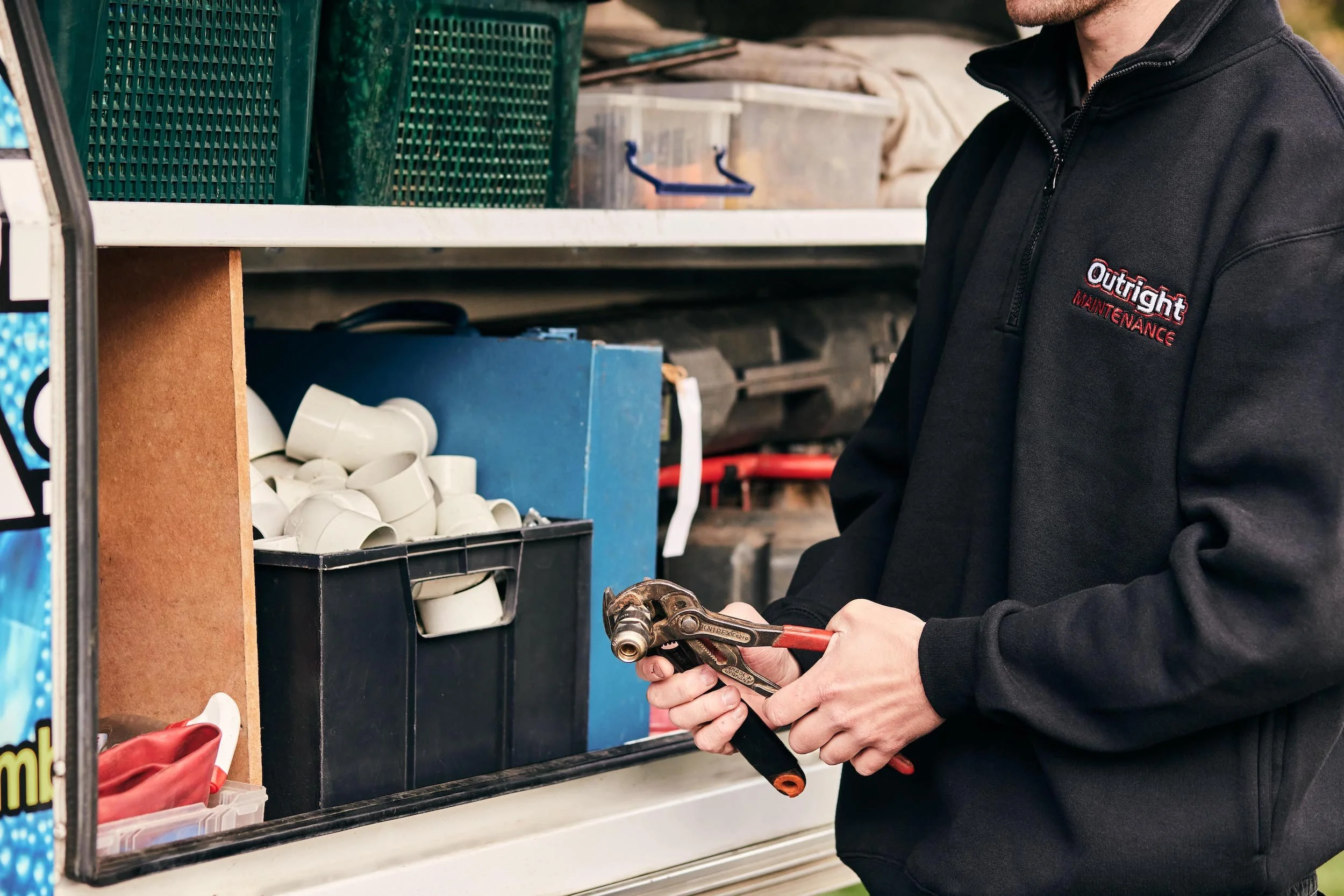
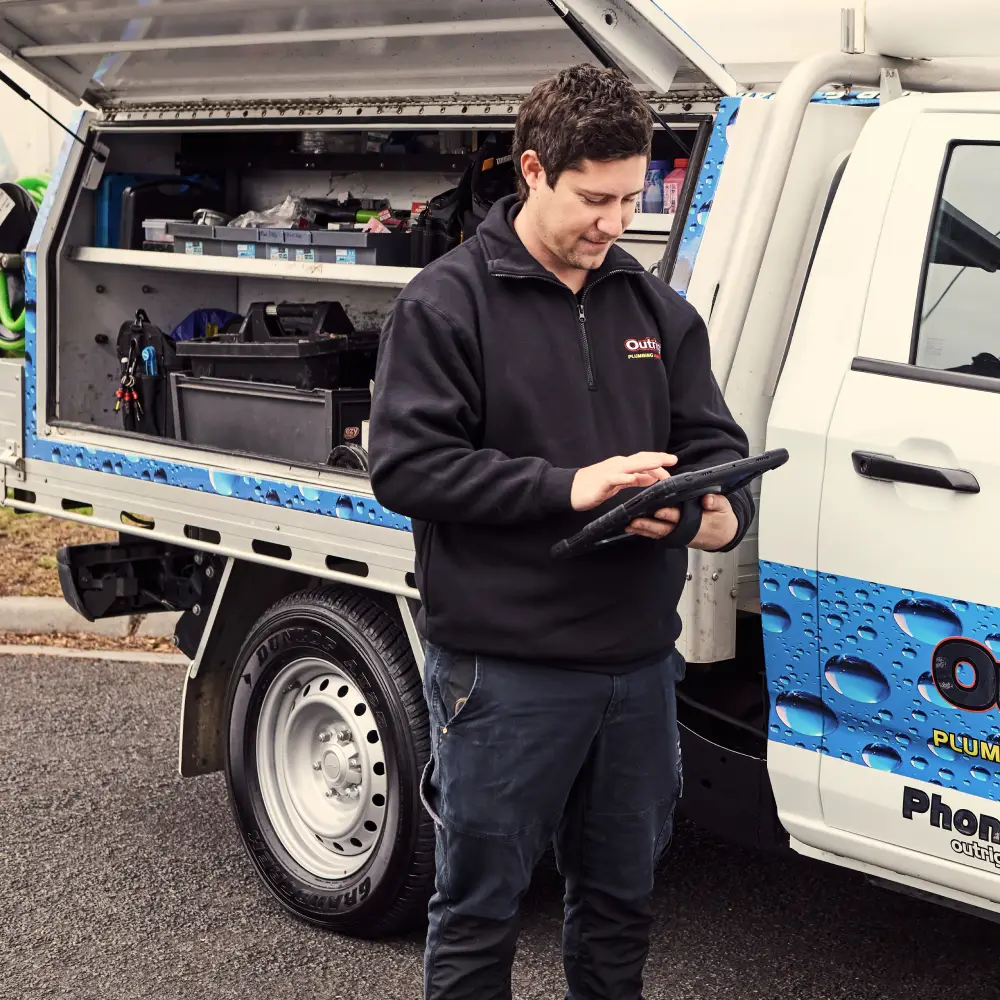
We provide leak detection services for commercial properties
In commercial and multi-property settings, leaks can go unnoticed until the damage is severe. Hidden water escaping in walls, ceilings, or underground pipework can lead to spiralling repair costs, disputes, and downtime. Outright Plumbing works with Melbourne businesses and managers to detect and fix leaks before they cause bigger problems.
- Multi-storey apartments: A leak on one level can spread quickly, affecting multiple units. We use acoustic and thermal tools to trace the exact source and provide clear reporting for owners and tenants.
- Retail and hospitality spaces: Water escaping behind walls or under floors can damage stock, interrupt service, or trigger health and safety issues. Fast detection keeps operations running and costs contained.
- Office buildings and schools: Ageing pipework in large buildings often leaks in hidden cavities where access is difficult. We carry out pressure testing and targeted inspections to locate the problem without disruption.
- Underground services: Buried mains or irrigation lines can leak for months before surfacing as low-pressure or unexplained water use. Our outdoor detection methods isolate the fault accurately, avoiding unnecessary excavation.
Proof we don’t just fix one thing well
Scroll through our gallery and you’ll spot all sorts of crisp pipework, fresh installs and clever fixes. Whatever you throw at us, we’ve probably handled worse.


Why Melbourne calls Outright Plumbing when there’s a leak
We know the homes and pipes in Melbourne’s south
After decades of working across Bayside and the surrounding suburbs, we can spot the common trouble areas in local homes before we even unpack the gear.
We use the right tools and the right judgement
We bring listening devices, thermal cameras and pressure testing equipment, and combine them with experience to get results without causing unnecessary damage.
We sort out the cause, not just the symptom
If the leak is coming from cracked pipework, roof issues or a damaged drainage line, we will address that too so you are not dealing with the same problem twice.
We keep you in the loop from start to finish
You will always know what we are doing, why we are doing it and how much it will cost. There are no surprises, no jargon and no disappearing acts.
We send our leak detection specialists across Melbourne
You will spot our vans everywhere from Caulfield East to Mordialloc, Hampton to Keysborough. We stick to Melbourne’s southern suburbs so we can get to you quickly, and because we like working close enough to still make it home for dinner.
Our plumbing team
You might not get the same face every time, but whoever turns up will know their stuff, respect your home and get the job done right.
Questions you want to ask a plumber about pipe leaks?
We’ve answered the most common ones so you can get clear, practical info before we even arrive.
How much does a water leak detection cost in Melbourne?
In most cases, leak detection in Melbourne will cost somewhere between $250 and $500. The exact price depends on how tricky the leak is to find and what kind of gear we need to use. If it’s a simple job (like finding a leaking flexi hose under a sink) it’s usually on the lower end. If the leak is buried under concrete or hiding in a wall cavity, it can take longer and need more specialist equipment, which pushes it up a bit.
The good news is we’ll always give you a fixed price before we start to detect leaks or make fixes, so you know exactly what you’re up for. If we find the leak and you want us to repair it then and there, we’ll give you a separate fixed quote for that work too. If it’s connected to something bigger, like a burst water pipe or a cracked stormwater line, we can take care of that as part of the job.
How do plumbers detect hidden leaks?
Finding a hidden leak is part science, part detective work. Our qualified Victorian plumbers use specialist tools like acoustic leak detection devices that “hear” water escaping under floors or inside walls, thermal cameras that show temperature changes caused by water, and pressure testing to see where the system is losing water.
But the tools are only half the story. After decades working in Melbourne’s southern suburbs, we know where certain leaks like to hide. For example, we’ve seen plenty of copper pipes corrode in older Bayside homes, and plastic pipes crack where they’re exposed to UV in newer builds. This local knowledge means we can get to the problem faster and cause less disruption to your home. If we find the leak is related to a roof plumbing issue or a damaged underground drain, we can sort that out, too.
By the way, we handle both water and gas leaks, so don’t hesitate to get in touch with our gas leak detection plumbers.
What are the signs of a water leak I should look out for?
Not all leaks are obvious puddles on the floor. Some are sneaky and can go unnoticed for months. Here’s what to watch for:
- Your water bill suddenly jumps, but your usage hasn’t changed
- Damp or discoloured patches on walls, ceilings or floors
- Mould or mildew appearing in places it shouldn’t
- A drop in water pressure around the house
- The sound of running water when every tap is turned off
- Soft, muddy spots in the garden even during dry weather
If you’ve noticed wet patches outside, it might be a sign of a broken stormwater or sewer pipe. Our stormwater services and sewer line cleaning can get those issues sorted before they cause major flooding or damage.
Will my water need to be turned off during the inspection?
Sometimes, but only for a short time and only when it’s necessary. If we’re using acoustic or thermal equipment, we can usually keep your water running while we work. However, if we’re doing a pressure test or opening up a section of pipe to investigate further, we’ll need to shut off the supply briefly.
We’ll always give you a heads-up before we turn the water off, and we’ll plan the work so you’re without water for the shortest time possible. If you can’t go without water for long, we can schedule the leak detection alongside other plumbing fixes, like a dripping tap or leaking toilet repairs, so it’s all done in one visit.
How can I prevent water leaks from happening in the first place?
While some leaks are unavoidable, a bit of regular care goes a long way. Here’s what we recommend:
- Book regular plumbing check-ups. A yearly plumbing maintenance visit can catch small issues before they become big leaks.
- Inspect visible pipes and fittings. Look under sinks and behind toilets for signs of rust, corrosion or wear.
- Replace flexi hoses every 5–10 years. They’re one of the most common causes of sudden flooding in homes.
- Clear gutters and drains. Our blocked stormwater drain services can help prevent backups that put pressure on your pipes.
- Watch for changes in water pressure. If you notice a sudden drop, our low water pressure service can identify the cause before it turns into a bigger issue.
Have a browse through our extensive range of plumbing services and let us know if there’s anything you’re interested in learning about for your site.
Will you provide a report or photos of the leak for insurance?
Absolutely. Outright Plumbing’s residential and commercial leak detection plumbers can give you a written report outlining where the leak is, what’s causing it, and how it can be fixed. We’ll also take photos of the leak and any damage it’s caused. This makes it much easier for you to lodge an insurance claim and speeds up the process with your provider.
If repairs are needed, we can also quote for them right away. That might mean replacing damaged pipework, fixing a faulty fitting, or sorting out a related issue like a blocked drain that contributed to the leak.
What should I do if I’ve found a water leak?
Outright Plumbing’s Melbourne leak detection experts have a few bits of key advice for you:
For major leaks:
If water is gushing out or pooling quickly, turn off your main water supply immediately. The shut-off valve is usually near the front of your property, close to the water meter. If water is anywhere near power outlets or appliances, turn off the electricity at the mains too. Then call us straight away — the faster we get there, the less damage there will be. If the leak is due to a pipe that has burst, we can provide fast burst pipe repairs to stop it in its tracks.
For minor leaks:
If it’s a slow drip, you can do a couple of things to minimise damage before we arrive. Place a bucket or container underneath to catch water, or wrap the leak with a rag or plumber’s tape to slow the flow. Try not to use that part of the plumbing until it’s repaired.
In both cases, it’s important not to ignore the problem. Even small leaks can cause structural damage, mould growth, and higher water bills if left too long. Regular plumbing maintenance can help prevent leaks like these from popping up unexpectedly.
Tales from the tap end
Plumbing advice without the head-scratching jargon is perfect for anyone who wants to stay one step ahead of their next drip, clunk, or blockage.
Flush with good content
Our Instagram is full of oddly satisfying fixes. Follow along for plumbing that’s more entertaining than you’d think.
Need leak detection in Melbourne right now?
Call us today. The longer water runs where it shouldn’t, the more damage it causes; the faster we get there, the easier it is to fix.






.svg)

.svg)






.svg)






.svg)











.svg)


